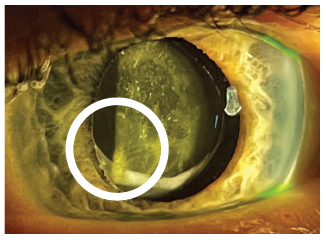After cataract surgery, the implant (artificial lens) is supported by a transparent membrane called the posterior capsule, which lies just behind the implant. Clouding of this transparent membrane is the most common complication of cataract surgery. It can occur in 10-20% of patients. It causes blurred vision and glare can occur weeks, months or years after the operation.
The YAG laser capsulotomy procedure creates an opening in the cloudy membrane to clear the vision.

An opening is made in the middle of the cloudy membrane with the laser
Risks
YAG laser capsulotomy is a safe procedure but there is a small risk of complications. The potential risks associated with YAG capsulotomy are:
- Detachment of The Retina (The Nerve Layer at the Back of the Eye that Detects Light)
This is a rare complication with symptoms such as new floaters and flashing lights which you should report to your consultant. The risk is about 1% after routine cataract surgery and is reported to be between 1-2% after YAG capsulotomy laser. If this issue arises then you may need further retinal treatment (laser or surgery) to fix the detachment. - Floaters which usually settle over 1-2 months. These are very common/universal immediately after the laser treatment. They usually take a few days to a few weeks to disappear. It is highly unusual for floaters to increase and persist after this laser treatment, but it can happen. In most cases, if floaters increase then your brain gets used to them and they usually become unnoticeable.
- Fluid in the centre of the retina (called cystoid macular oedema)
This is a rare complication (about 1%) and this issue can temporarily reduce your vision. This problem would need extra anti-inflammatory eye drops to resolve the fluid and improve your vision. - Damage (called Lens pitting)
This occurs very rarely & happens if the laser energy causes some impact effect on the adjacent lens. This is only a problem should the lens pitting occur directly on the visual axis (in the line of vision), and this is usually avoided by performing the YAG laser in a way that avoids this issue. - Elevated eye pressure
This is quite common BUT depends on the laser energy used so this is difficult to quantify. If a lot of laser power is needed to perform the procedure, this can cause a temporary rise in eye pressure. It might be necessary to give eye drops &/or tablets to reduce the risk of this happening. Sometimes, this medication is used before the laser as a precaution and/or afterwards if the energy used is greater than expected.
In most cases these rare conditions can be treated with no permanent loss of vision.
The day of your treatment
The treatment takes approximately 10 minutes, but please allow 45 to 90 minutes at the hospital.
On arrival we will explain the procedure and ask you to sign a consent form. Drops are instilled to dilate your pupil and numb the eye. The procedure is performed with you sitting and resting your chin on a machine similar to that used to examine your eye. A contact lens may be put on your eye to steady it and focus the laser beam. You will see some bright lights and hear a clicking noise during the treatment but there is no pain.
After your treatment
Before you go home you will have some eye drops instilled. The eye may become pink and sore and the vision may be blurred for some hours. For this reason, patients are advised not to drive home.
Apart from driving, you can resume normal activities immediately. Most patients notice an improvement in vision within a day, while others experience a gradual improvement over several days.
You will need to visit your optician to check your spectacle prescription after 1 week.
If you have any queries or concerns
In the unlikely event of pain not relieved by simple painkillers, a drop in vision, a very red eye or seeing flashing lights and floaters, please contact Eye Clinic 01582 491166, please ask the operator to bleep the Ophthalmic Nurse Specialist on 110 or 273 Monday – Friday 9am – 5pm.
After 5pm and at weekends ask the operator to bleep the on call doctor.
